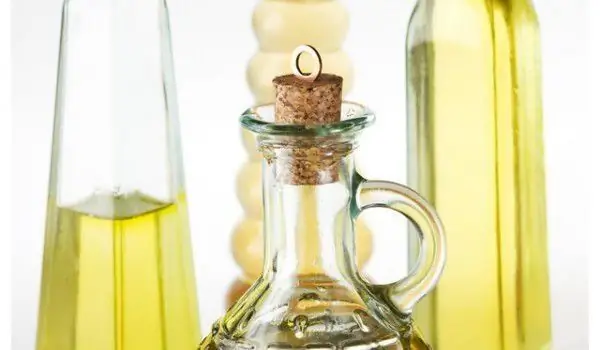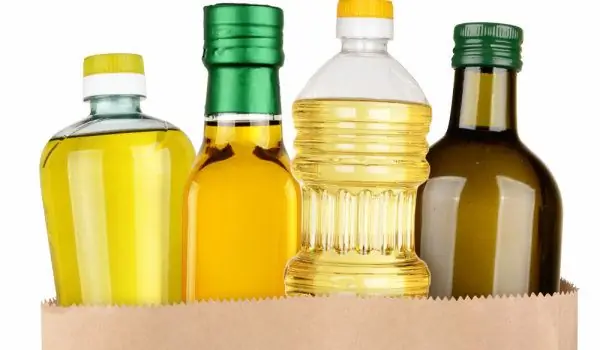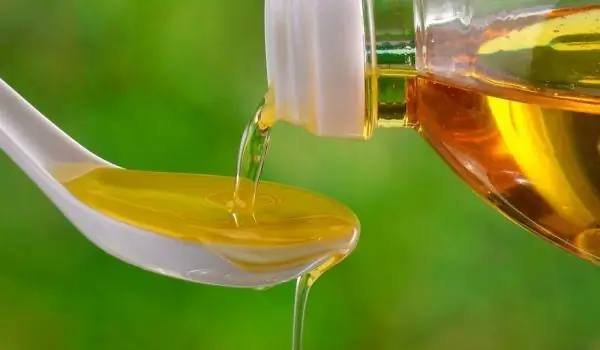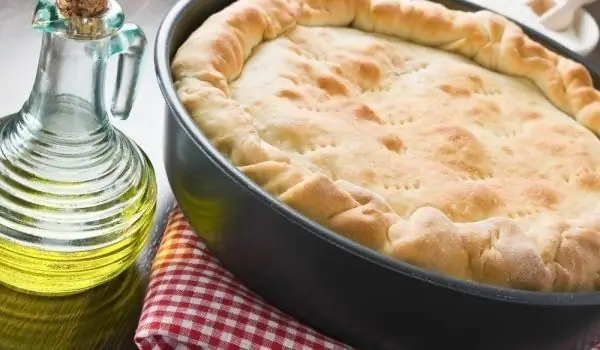2025 Author: Jasmine Walkman | [email protected]. Last modified: 2025-01-23 10:18
Oil or vegetable oil is the most popular and frequently used fat in our latitudes. Its use has its positive and negative features, which a person should be familiar with, especially if he consumes oil daily. There is sunflower oil, olive oil (olive oil), coconut oil, rapeseed oil, linseed oil, castor oil and others. The most suitable for use are sunflower oil and olive oil. Recently, the advantages of rapeseed oil have been pointed out, but it does not have a wide culinary application. Rapeseed and flaxseed vegetable fats are a suitable raw material for making various products in cosmetics, chemical industry, pharmaceuticals and other industries, and not for direct consumption.
We have the term oil sunflower is most often recognized. In essence, oil is the final product of oilseeds and essential oils by mechanical pressing or chemical extraction. It can be refined or unrefined, being obtained mainly from the seeds of plants. The sunflower plant itself comes from the steppe lands of North America and arrives in Europe as an ornamental plant in the very beginning. Around 1520, the sunflower was brought to the Botanical Garden in Madrid. Its exploitation as an oil crop began only in the early 19th century, when it began to produce oil in Russia. In Bulgaria, the process of oil production began after the Liberation.
The sunflower oil is extracted from sunflower seeds (Helianthus annuus). They are the third most widespread oil crop after soybeans and rapeseed in the world. Today, the largest oil-producing countries are the People's Republic of China, Russia, Argentina, France, Ukraine, and Australia. Within the Old Continent, Bulgaria is one of the most important and largest producers of sunflower and vegetable fat from it. We grow a large selection of varieties.
The unrefined oil is obtained by pressing raw seeds together with their husks. This oil is extremely rich in vitamin E, omega-6 fatty acids and omega 9 EMF. It does not contain toxic residual agents (acids) from chemical treatments because they are not used in the production process. Refined oil can be single or double refined. It is obtained chemically from dried or roasted seeds by filtering several times to clear any protein residues. The advantage is that vegetable oil does not contain cholesterol - it comes only from animal fats.

The oil is a high-calorie product, useful mainly with essential fatty acids, which it feeds the human body. Unsaturated fatty acids are metabolized in the body in different ways and their derivatives are obtained, which are of great importance for the normal course of basic vital functions. They participate in the regulation of vascular tone and the tone of smooth muscle organs, in fertilization and reproductive function, in childbirth, in the processes of blood clotting.
However, the fat requirements for a balanced diet should be in the range of 68 to 138 g per day, depending on gender, age and physical activity. In a healthy and dietary diet, the energy content of fat should represent about 30% of the total energy balance.
Oil composition
Oil is a source of unsaturated fatty acids. In 100 g of pure oil contain:
- from 48% to 74% linoleic fatty acid - omega 6 EMC;
- from 14% to 40% oleic fatty acid - omega 9 EMC;
- from 4% to 9% palmitic fatty acid;
- from 1% to 7% stearic fatty acid.
The oil is extremely rich in omega 6 and omega 9 fatty acids, and their percentage varies in different brands of oil. In addition, the oil is an important source of lecithin and vitamin E (a powerful antioxidant), as well as vitamin A.
Types of oil
Sunflower oil - the most famous and used oil in our country. It has an almost imperceptible smell and a high smoke point - 230 degrees. This makes it an oil suitable for almost any culinary purpose - flavoring salads, stewing, frying.

Olive oil - According to the method of extraction, there are several types of olive oil - Virgin, Extra virgin, Pure and Pomace. The first two species were obtained only by mechanical extraction, without the participation of any solvents. Pure olive oil is a mixture of refined and unrefined olive oil, and Pomace is made from olive oil by chemical extraction.
Unrefined types of olive oil should not be used for frying, because at higher temperatures there is a change in the chemical composition. They are perfect for salads. Refined and olive oil obtained from cake have a high smoking accuracy, which makes them suitable for frying.
Corn oil - is obtained from the germs of maize seeds. It has a pale color and almost no aroma, and its boiling point is high. The problem with this type of oil is the large amount of polyunsaturated fats it contains, because they cause a reduction in the levels of good cholesterol.
Soybean oil - a new product that is gaining wide popularity. It is obtained by chemical extraction and can be used for any culinary needs. It also contains a large number of polyunsaturated fats.
Walnut oil - together with olive oil, it was the main vegetable fat used in our lands before the entry of sunflower as a widely used crop. It is obtained from dried pressed walnuts. It is not refined, which is why it has a rich taste and aroma, but also great perishability. It should be stored in the refrigerator. It is used for flavoring salads, because when fried it acquires a bitter taste.
Rapeseed oil - Nowadays it is one of the most widely used vegetable fats. It is rich in monounsaturated fatty acids, but contains toxic erucic acid, which does not make it suitable for everyday use.
Sesame oil - vegetable fat, widely revered in the East. It occurs in two variants - light, which is obtained from raw seeds, whose taste is barely perceptible, but significantly changes the taste of cooked food. The second type is dark sesame oil, obtained by pressing roasted seeds. It has a very intense taste, so just a few drops of it are enough.
Grape seed oil - used for all culinary purposes. It has a very weak and neutral taste of nuts. Studies show that many of the nutrients contained in wine are also present in this type of oil.
Peanut oil - Olive oil is an indispensable part of Mediterranean cuisine, and peanut oil - in the cuisine of East Asia. It withstands very high temperatures, which makes it suitable for frying. It can be compared to olive oil in terms of monounsaturated fatty acids, but the nuts in it make it very unsuitable for people with allergies.
Pumpkin seed oil - produced in the border area between Austria, Slovenia, Croatia and Hungary. This type of oil has a tile color and a greenish tinge. Used to flavor salads and other cold dishes.
Selection and storage of oil
When choosing an oil, you must demand that it be extremely clean, have shine and clarity. It is important to be universal - to have a pleasant taste, to be usable for frying, cooking and salads. Quality oil should start to smoke at temperatures above 200 degrees, not to spray and not to foam.

Choose sunflower oil from certified manufacturers. The shelf life of the oil is at least two years after opening the package.
Proper storage of sunflower oil is important to preserve its taste. Do not hold the bottles with oil in direct sunlight and high temperature. Its durability depends on heat, light and moisture and therefore the oil should be stored in dark, dry and cool places. If you do not close the caps well, the oil will oxidize faster.
Cooking oil
The oil is one of the most preferred fats for culinary use because its price is relatively lower than that of olive oil. In addition, it is universal - it is excellent for raw use, for frying, baking and cooking. The unrefined oil are used raw consumption - for salads, dressings, etc., and refined has a wider culinary use due to the oxidation of essential fatty acids, which as a result of heat treatment are oxidized and saturated.
The oil is one of the main ingredients of mayonnaise, margarine, for the preparation of lutenitsa and all kinds of pickles and winter vegetables. It has been shown that the absorption of many vegetables is better if they are seasoned with fat. The good effects of the oil on human health come only if it is consumed in reasonable quantities.
Benefits of the oil
The presence of vitamin E in the oil makes it a powerful antioxidant. It has a positive effect on the immune and cardiovascular systems. The lecithin in the oil supports the functioning of the cells by providing material for their cell membranes. Unsaturated fatty acids are important for regulating vascular tone and the tone of smooth muscle organs. They are important for fertilization and reproductive function, in childbirth, as well as in blood clotting processes. Due to the low or almost no cholesterol content, the oil protects the heart.
The oil has a certain antimicrobial effect. If applied to the skin, it reduces its susceptibility to infections. An old Russian recipe against bleeding gums and periodontitis is splattering in the morning before brushing your teeth with oil. This gurgling is thought to help get rid of toxic toxins in the liver and bile as they accumulate in the gums. The benefit on the gums of the oil is due to the vitamin A contained in it. oil as a way to detoxify the whole body. The mucous membrane of the mouth detoxifies the whole body, which in turn strengthens cells, tissues and organs.
Dr. Karah recommends drooling daily, in the morning on an empty stomach, and never swallowing the resulting fluid because it is full of toxins. After splashing, rinse thoroughly with water. To speed up the effect, the procedure can be done in the evening before eating, and maximum results are achieved with cold-pressed oil. An additional effect is teeth whitening. This Russian method has a positive effect on headaches, bronchitis, gastrointestinal and kidney diseases, osteoarthritis, gynecological diseases.

Damage from oil
Deficiency of essential (unsaturated) fatty acids (EMA), such as those contained in the oil, has been found to slow growth, impaired water metabolism, decreased immunity, kidney damage and skin manifestations. The oil must be alternated with the consumption of other fats. Excess oil can worsen the balance between omega-3 and omega-6 EMFs, which in turn adversely affects the immune system.
The use of heat-treated refined oils has been found to increase the risk of malignancies. This is due to the chemical pollutants they contain and the oxidation of linoleic and oleic EMC. Granulated oils are toxic and should not be consumed. Oils and oils subjected to the process of hydrogenation are harmful to human health because they bring into the body the so-called trans fats, which cause many of us to gain weight and have heart problems.
Recommended:
How To Store Olive Oil And Vegetable Oil

The oil is stored quite a long time thanks to its factory packaging. It is sold with a tightly closed lid and thanks to this it can retain its qualities for two years. Oil bottles should be stored in a cool dark place. It is better to store oil that is sealed in glass rather than plastic bottles.
Okra Oil Replaces Coconut Oil

Okra (Abelmoschus esculentus, Hibiscus esculentus) is an annual herbaceous plant, reaching a height of nearly one meter. The use of okra is broad-spectrum. The fruits can be eaten fresh or dried and added to various dishes, soups or sauces.
Olive Oil Versus Rapeseed Oil: Which Is Healthier?

Rapeseed oil and olive oil are two of the most popular cooking oils in the world. Both are touted as heart healthy. However, some people wonder what the difference is and what is healthier. What is rapeseed and olive oil? Rapeseed oil is produced from rapeseed (Brassica napus L.
Castor: Corn Oil Was More Useful Than Olive Oil

Corn oil is proving to be more valuable for health than the olive oil, which is said to be the most useful fat, reports Eurek Alert. Corn oil lowers cholesterol levels more successfully than cold-pressed olive oil, say researchers who conducted the study.
Why Is It Good To Replace Oil With Olive Oil?

Increasingly, nutritionists and all other health professionals recommend that we stop using oil and replace it entirely with olive oil. Unfortunately, the price of olive oil is much higher than that of ordinary oil, and for this purpose we need to find out if this is really necessary.

